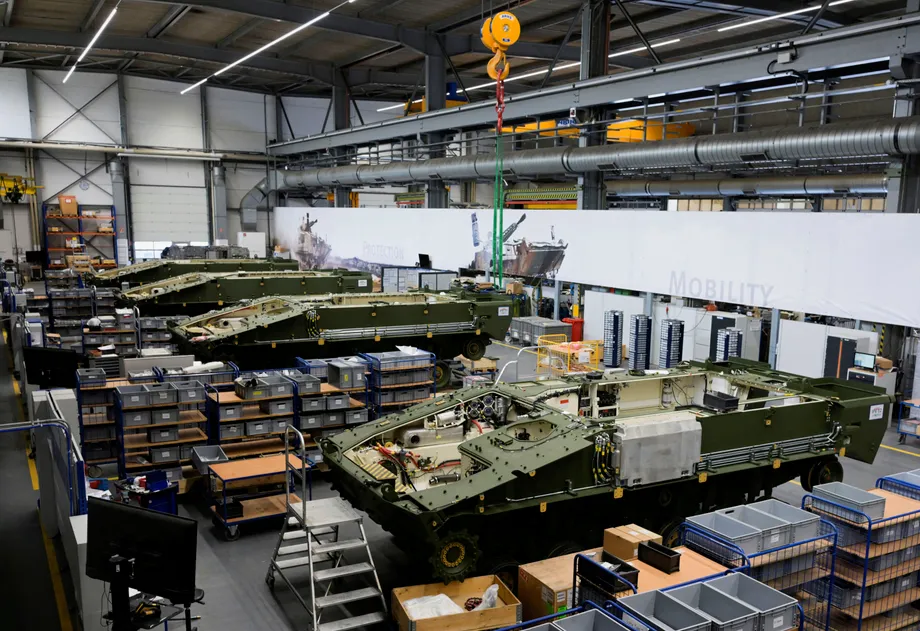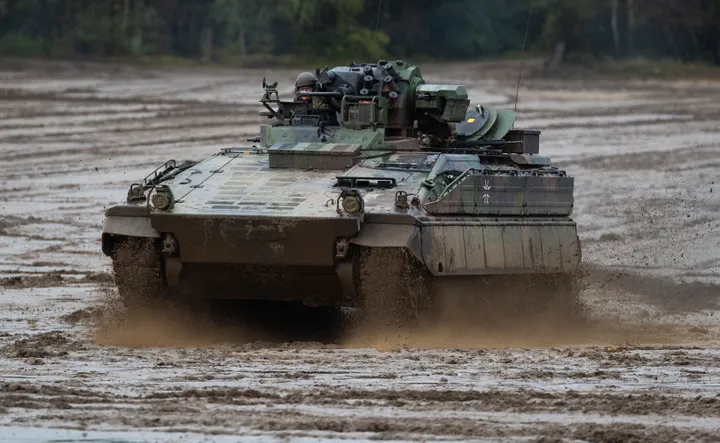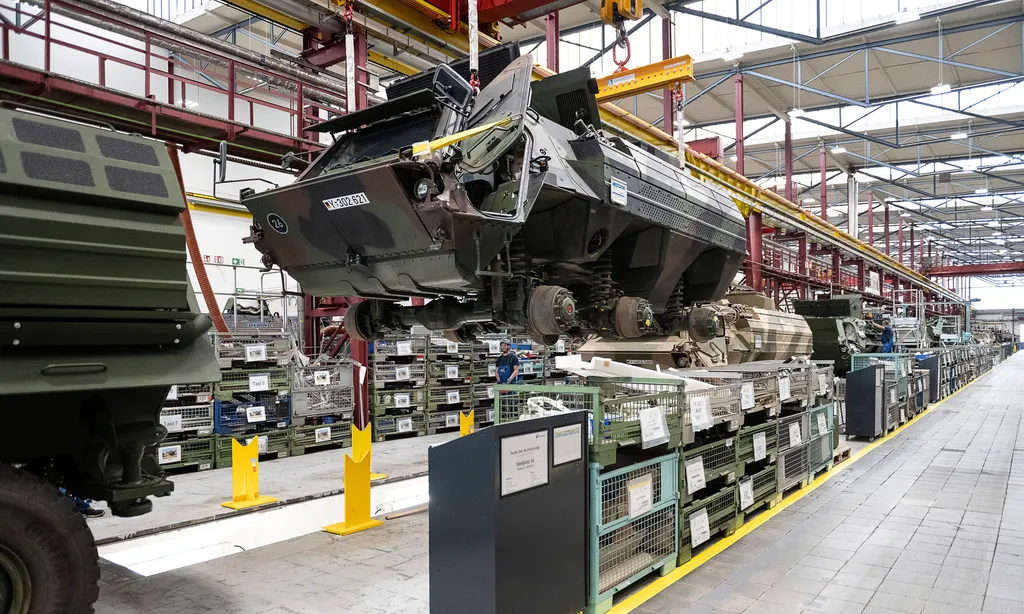De acuerdo a este artículo de la publicación alemana “Der Spiegel” la respuesta es: demasiado poco y demasiado anticuada: si Estados Unidos abandonara la protección de Europa, el arsenal de armas alemán apenas sería suficiente para defender el país. Empresas como Rheinmetall y Krauss-Maffei Wegmann están intentando cambiar el status quo, pero la industria aún es demasiado débil.
On Wednesday morning last week, Susanne Wiegand stood in the large trading hall of the Frankfurt Stock Exchange. The executive triumphantly raised her bell in the air. Behind the woman in the dark blue dress, the scoreboard read 17.50 euros. That was the opening price of shares in the defense company Renk, which had its IPO that day, 17 percent higher than the issue price.

For Wiegand, it is a source of satisfaction. She spent a lot of time working toward the IPO. “It was a marathon for us, which has now ended happily,” says the Renk CEO. But this tank transmission manufacturer’s success story is probably only the very beginning. Since Donald Trump announced last weekend that if he were returned to the White House, the United States would not support NATO partners against a Russian attack if they aren’t spending enough on defense, Renk shares have risen to over 25 euros.
The shares of other European defense companies are also soaring at the moment. As upset as European politicians are in their reactions to Trump’s outburst, investors on the stock market see the development as an economic stimulus package for Europe’s arms industry. Who after all, if not Renk, Rheinmetall and other German defense ministry companies, is supposed to put Europe in a position to defend itself?
Since Russia’s invasion of Ukraine in February 2022, the order books have been filling up. Sales and profits are climbing because the German government is once again spending significantly more money on arms. In 2022, the budget jumped from 7.3 to 8.7 billion euros, then to 16.2 billion last year, of which 8.4 billion came from the special fund that Chancellor Scholz announced three days after the outbreak of war.
The problem is that the industry is starting from a low level. After the fall of the Berlin Wall, the German government cut spending on war material. Today, the industry is far from mass production. The factories are more like specialized boutique shops. There’s too little to equip a country like Ukraine against an overpowering enemy. And definitely not enough to make Germany fit for war at the same time.
A Shortage of Steel and Explosives
There is a shortage of production facilities and skilled workers, even of basic materials such as steel and explosives. Political leadership is also lacking. So far, everyone seems to agree on one thing: That consolidation is needed in the European defense market. The continent will not be able to defend itself with small- and medium-sized enterprises in every member state.
“Many of our companies have made efforts, in some cases at their own risk, to improve the the German military’s equipment as quickly as possible,” says Hans Christoph Atzpodien, managing director of the German Security and Defense Industry Association. But his pride in the achievements of the past two years is mixed with concern that the rearmament effort will abate.
Atzpodien says it is regrettable that the German government didn’t heed the call for an increase in the regular defense budget. “Because the 100 billion euro special fund will probably be used up by 2027 at the latest.” He says that more reliability and, above all, concrete orders, are needed. The industry needs lead time to ramp up production. “The sooner orders are placed, the faster they can be delivered,” says the arms lobbyist.
A $1.6 Backlog in Modernization
The management consultants at McKinsey view the situation similarly. They came up with some impressive figures in a new study on European defense. Based on announced military spending, defense budgets in Europe will increase by 700 to 800 billion euros between 2022 and 2028, the report notes. This is a significant increase compared to previous spending levels, but it may not be enough to make up for the backlog of decades of lower investment, it states.
The McKinsey analysis show that the European NATO states have spent $1.6 trillion less over the last three decades than would have corresponded to the 2-percent target agreed by NATO in 2014. According to the report, large parts of the European armaments systems are outdated. In the case of land systems, such as tanks and howitzers, around 50 percent of all systems in Europe were put into operation before 1990; for land-based air systems, such as air defense, that figure is up to 80 percent.
According to McKinsey, the fragmented corporate landscape is also to blame for the situation. It has led to two to three times as many European suppliers competing for aircraft, tanks and ships than in the United States. Europe’s leading defense companies only generate around 30 percent of the turnover of an average U.S. competitor, and they are less profitable.
Strength lies in size, but there has been little consolidation in the European defense industry. In Germany, this is also partly due to two large companies that have always been at loggerheads with each other: Rheinmetall and Krauss-Maffei Wegmann. Both are pursuing different paths to becoming global players.
If you want to visit Rheinmetall these days, you first have to get past two men with submachine guns. For some time now, the police in Düsseldorf have had a permanent post in front of the company’s headquarters. CEO Armin Papperger doesn’t want to discuss the reasons in detail. Not everyone likes Rheinmetall, he jokes, but he says he has to live with that.
Papperger has a lot to offer that both Ukraine and the Germany’s armed forces, the Bundeswehr, urgently need. In Germany, Rheinmetall dominates the market for all types of ammunition – from 155-millimeter shells for artillery, 120-caliber shells for main battle tanks or 35-millimeter shells for the Gepard anti-aircraft tanks, which are indispensable in the fight against swarms of drones in Ukraine.
The Rheinmetall boss is one of the winners in this crisis. Before the Russian invasion, the company’s share price had been at 90 euros. This week, with the ground-breaking ceremony for a new artillery ammunition plant in Unterlüss, Lower Saxony, the share price climbed to 360 euros. Papperger secured some 20 billion euros in orders last year. The company is aiming for 28 to 36 billion euros for 2024.

But Papperger will not be able to achieve his goal with the new plant in Unterlüss alone. He plans to produce 700,000 rounds of artillery ammunition as early as 2025, and has also ramped up the capacities of his other plants in Europe. Meanwhile, he is also expanding the company’s production of explosives. If everything goes smoothly, Rheinmetall will soon be completely self-sufficient in the production of artillery ammunition, from the primer to the cartridge case.
Like a Trader at a Bazaar
Papperger wants to create an international armaments company using his own resources. Years ago, he bought companies in Italy and South Africa, for example, in order to circumvent the German government’s restrictive arms export controls. When Papperger describes his everyday life, he sounds a little like a trader at a bazaar that has been besieged by its customers. He receives new requests for ammunition almost every day – from Ukraine, the German armed forces, but also from the United States and Spain.
This means that Rheinmetall doesn’t have to wait for purchase guarantees from the Bundeswehr before deciding to expand its plants in Germany and abroad. A handshake from German Defense Minister Boris Pistorius, sometimes even just a text message, is enough to give him security, says Pappberger. The ammunition plants aren’t the only major projects Rheinmetall is currently working on. Pappberger plans to manufacture tanks in Hungary and Ukraine soon, which prompted Rheinmetall to invest in local armaments companies.
Papperger’s industry adversary is named Frank Haun. At best, the two are united by the ambition to turn their respective companies into armaments giants that can compete worldwide. Haun is head of the Franco-German joint venture KNDS, a merger of Krauss-Maffei Wegmann from Munich and the French state-owned company Nexter near Lyon.
The merged company is said to have practically everything on offer to fight a land war – from tanks and artillery to ammunition and howitzers. “Only a European company can rise to the challenges that this continent is currently facing,” says Haun. He argues that this is also the only way to ensure that the weapon systems can be used and exchanged in the armies of the European member states in the future.

But things have been slow since the launch of the joint venture almost 10 years ago. The corporate cultures are too different. On the one side, you have a German family owned business, and on the other a French state-owned company. The company structure is only gradually gaining momentum, which is also attributable to the fact that revenues are increasing on both the German and French sides. KNDS is currently investing in new factories and ramping up the production of ammunition, including in France, Belgium and Spain.
Haun probably scored his biggest coup shortly before Christmas, when he signed a letter of intent with the Italian arms manufacturer Leonardo, a global heavyweight. The Italians could acquire a 20 percent stake in KNDS. That would water down the German and French influence, but that would also suit Haun. He’s hoping that could help bring an end to the deadlock in the consortium.
The government in Rome also wants to order at least 125 Leopard tanks of the latest generation and manufacture them in Italy. Haun’s order volume, currently around 17 billion euros, is set to increase.
In Germany, on the other hand, the tank manufacturer has little going for it. Germany owns around 300 battle tanks, a figure Haun believes to be far too few. A further 18 units have been firmly ordered to replace the Leopards delivered to Ukraine, but that’s it. Lithuania has orders on the books and Slovenia may follow. But Defense Minister Pistorius is hesitant. Haun has offered the German defense minister that if an order is made this year, it will be delivered in two years. He says that anything can be procured – production, components and raw materials. But only if Berlin decides now.
A Decisive Stock Deal
A week ago, Haun took another step toward becoming a European armaments giant. And this is also linked to Renk’s IPO. The KNDS boss has acquired 6.7 percent of the shares in the tank manufacturer for 100 million euros. As an anchor shareholder, he wants to prevent foreign powers from gaining access, according to company sources, and to secure his own company’s access to the important tank transmissions.
Like Haun, Renk boss Wiegand has a clear idea of how the European arms industry needs to change in order to make the continent ready for defense, even without American support if necessary. “We need uniform standards, money, scaling and industrialized processes,” says Wiegand. The most important thing, she says, is to standardize the requirements for tanks, howitzers and air defense systems. This also applies to approval procedures and export rules.
McKinsey argues that the lack of cooperation and separate procurement leads to duplication of research and development work and limits potential economies of scale. The result is that every new howitzer and every new guided missile costs too much. In view of limited defense budgets, this is a problem.
So is KNDS’ investment in Renk just the first step towards a complete takeover? Wiegand denies this. She says that Renk has a great interest in remaining independent. The company, after all, supplies almost every tank manufacturer in the world.
The German arms industry may lack many things, but there is certainly no dearth of self-confident leaders.
Correction: The entrance to Rheinmetall is guarded by men with submachine guns, not machine guns. We have corrected the passage.
Fuente: https://www.spiegel.de


